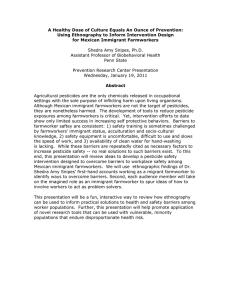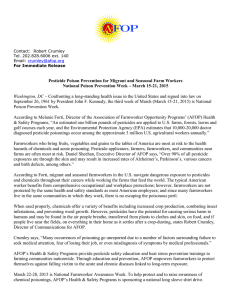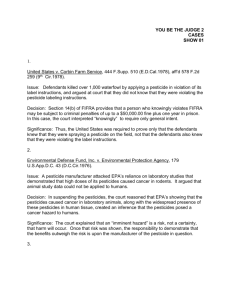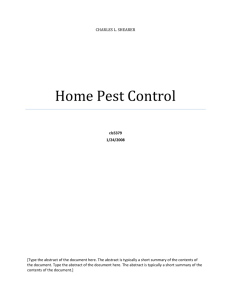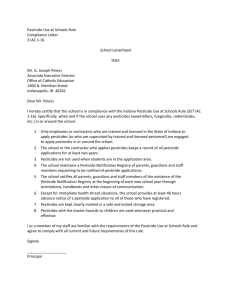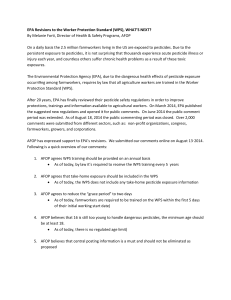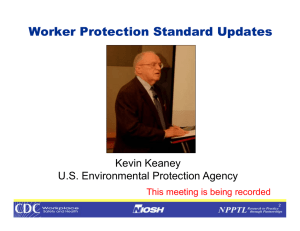Sample Comments document
advertisement
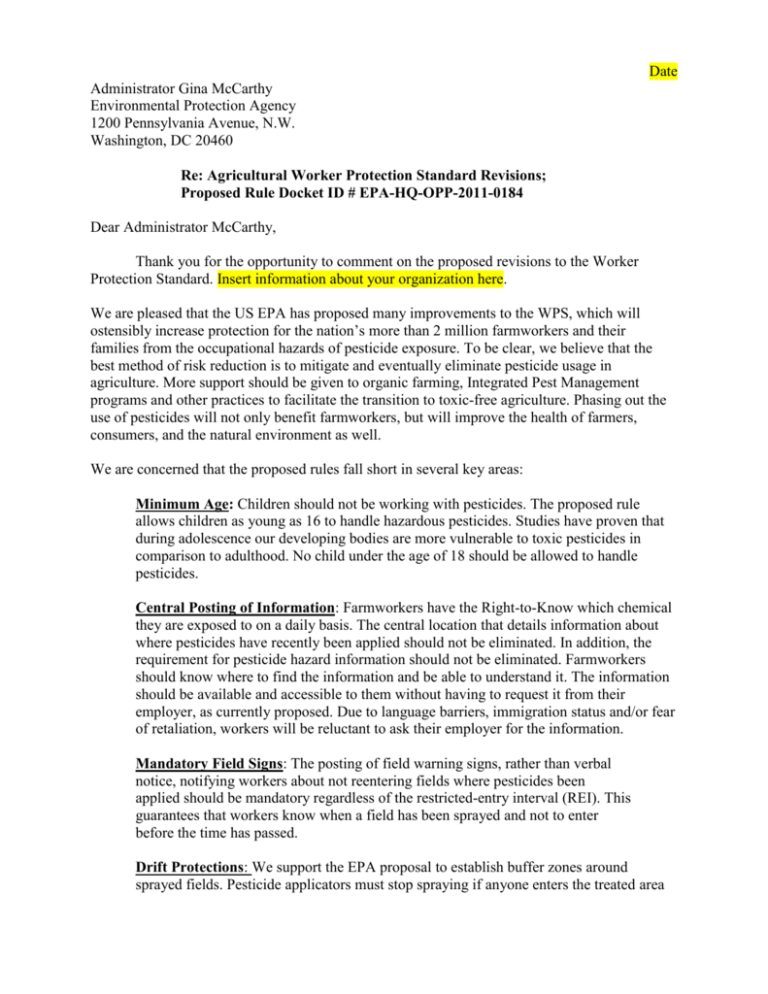
Date Administrator Gina McCarthy Environmental Protection Agency 1200 Pennsylvania Avenue, N.W. Washington, DC 20460 Re: Agricultural Worker Protection Standard Revisions; Proposed Rule Docket ID # EPA-HQ-OPP-2011-0184 Dear Administrator McCarthy, Thank you for the opportunity to comment on the proposed revisions to the Worker Protection Standard. Insert information about your organization here. We are pleased that the US EPA has proposed many improvements to the WPS, which will ostensibly increase protection for the nation’s more than 2 million farmworkers and their families from the occupational hazards of pesticide exposure. To be clear, we believe that the best method of risk reduction is to mitigate and eventually eliminate pesticide usage in agriculture. More support should be given to organic farming, Integrated Pest Management programs and other practices to facilitate the transition to toxic-free agriculture. Phasing out the use of pesticides will not only benefit farmworkers, but will improve the health of farmers, consumers, and the natural environment as well. We are concerned that the proposed rules fall short in several key areas: Minimum Age: Children should not be working with pesticides. The proposed rule allows children as young as 16 to handle hazardous pesticides. Studies have proven that during adolescence our developing bodies are more vulnerable to toxic pesticides in comparison to adulthood. No child under the age of 18 should be allowed to handle pesticides. Central Posting of Information: Farmworkers have the Right-to-Know which chemical they are exposed to on a daily basis. The central location that details information about where pesticides have recently been applied should not be eliminated. In addition, the requirement for pesticide hazard information should not be eliminated. Farmworkers should know where to find the information and be able to understand it. The information should be available and accessible to them without having to request it from their employer, as currently proposed. Due to language barriers, immigration status and/or fear of retaliation, workers will be reluctant to ask their employer for the information. Mandatory Field Signs: The posting of field warning signs, rather than verbal notice, notifying workers about not reentering fields where pesticides been applied should be mandatory regardless of the restricted-entry interval (REI). This guarantees that workers know when a field has been sprayed and not to enter before the time has passed. Drift Protections: We support the EPA proposal to establish buffer zones around sprayed fields. Pesticide applicators must stop spraying if anyone enters the treated area or the buffer zone. We feel that the buffer zone should be at least 100 feet, thus providing more protection to those close by from pesticide overspray and fumes Early Entry Workers: Early entry worker exceptions such as “limited contact” and “irrigation exceptions” would create loopholes in the proposed rule. No farmworker should be subjected to the poisonous toxins associated with early entry conditions and these exceptions should be eliminated. Training Frequency and Verification: Workers in other industries receive annual safety training and farmworkers deserve the same protection. To better protect our farmworkers and their families from pesticide exposure, we support the EPA proposal to require annual pesticide safety training for workers and pesticide handlers. The content of the training should be interactive and presented in a manner that is understood by farmworkers. Based on our experiences a wallet-sized verification card works best in the field, which is similar to the current voluntary verification card system. It is important to note that root-cause problems of farmworker’s occupational exposure to pesticides will not be remedied with the proposed rule. The current structure of the EPA does not have the capacity to enforce current or proposed regulations. Under the current circumstances, we cannot be assured that training is adequate, that pesticide specific information is readily available, that special protection for pesticide handlers exists, and that there is enforcement of the standard at the state level. In order for the proposed changes to be effective, responsible government agencies must have the capacity to enforce meaningful regulations and employers must also be held accountable for their actions. Funds must be channeled to the enforcement agencies so that a sufficient number of inspectors can be hired and inspectors must be bilingual and be able to speak Spanish and Creole. There should also be an increase in the number of surprise and random inspections at the farms and fines should be raised in order to discourage incompliance. Also, enforcement agencies should work closely with community-based farmworker organizations in ensuring farmworker safety. Again, thank you for the opportunity to comment on the proposed revisions to the Worker Protection Standard. Sincerely, Insert Your Name/Name of Organization

